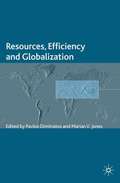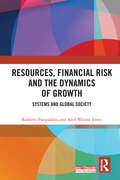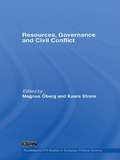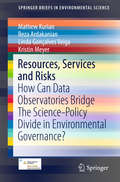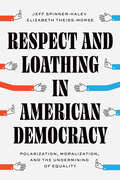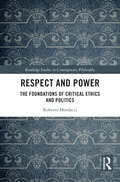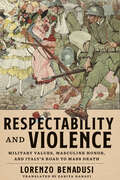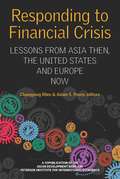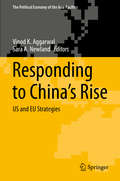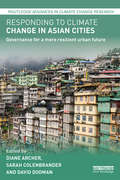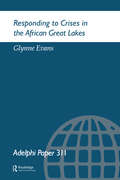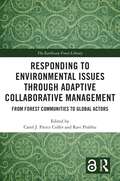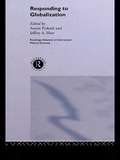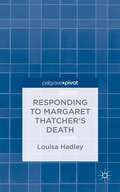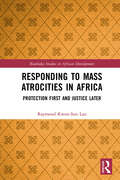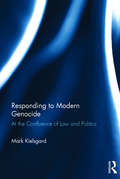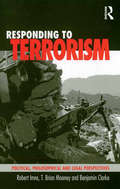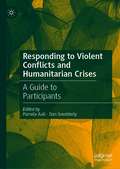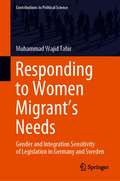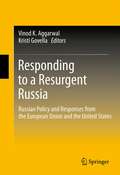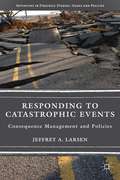- Table View
- List View
Resources, Efficiency and Globalization
by Pavlos Dimitratos Marian V. JonesInternational business for the modern firm has to compromise the need to use limited resources and achieve efficiency in the global marketplace. This book examines these issues from the viewpoint of the internationalized SME, the big multinational and the local subsidiary drawing on research conducted in different countries.
Resources, Financial Risk and the Dynamics of Growth: Systems and Global Society
by Roberto Pasqualino Aled Wynne JonesThis book presents a new System Dynamics model (the ERRE model), a novel stock and flow consistent global impact assessment model designed by the authors to address the financial risks emerging from the interaction between economic growth and environmental limits under the presence of shocks. Building on the World3-03 Limits to Growth model, the ERRE links the financial system with the energy, agriculture and climate systems through the real economy, by means of feedback loops, time lags and non-linear rationally bounded decision making. Prices and their interaction with growth, inflation and interest rates are assumed to be the main driver of economic failure while reaching planetary limits. The model allows for the stress-testing of fat tail extreme risk scenarios, such as climate shocks, energy transition, monetary policies and carbon taxes. Risks are addressed via scenario analyses, compared to real available data, and assessed in terms of the economic theory that lies behind. The book outlines the case for a government led system change within this decade, where the market alone cannot lead to sustainable prosperity. This book will be of great interest to scholars of climate change, behavioural, ecological and evolutionary economics, green finance, and sustainable development.
Resources, Governance and Civil Conflict (Routledge/ECPR Studies in European Political Science)
by Magnus Öberg Kaare StrømThis book explores how governance structures - domestic political institutions, international peacekeeping efforts, armed interventions by other states - and natural resources affect the onset, dynamics and the termination of civil wars. Written by leading researchers in the field of conflict research, it provides new insights into, and offers fresh perspectives on the role of governance structures and resources in civil conflict, suggesting that many of the same set of factors play important roles in the onset and dynamics of civil conflict as well as in the termination of such conflicts and in post-conflict stability. Presenting a variety of theoretical approaches and case studies on India, Sudan, the Basque country and Costa Rica, Governance, Resources and Civil Conflict will be of interest to students and scholars of politics, international relations and conflict studies.
Resources, Services and Risks
by Kristin Meyer Mathew Kurian Reza Ardakanian Linda Gonçalves VeigaThis book discusses the role of observatories in supportingevidence-based decision-making. The book focuses on issues of data accessibility,monitoring frameworks and governance processes with regard to environmentalresources - water, soil and waste. This publication highlights challenges related to policy-implementationmeasures and examines current monitoring approaches, and illustrates how theUNU-FLORES Nexus Observatory seeks to overcome concerns related to data,monitoring and governance of water, soil and waste resources. In particular,given that extreme weather events such as droughts and floods are predicted tobecome more frequent in the future, it discusses the need for improved hazardrisk monitoring. It proposes risk indices for drought and floods, which measureexposure and vulnerability to the phenomena through a multitude ofbio-physical, socio-economic and institutional indicators. Furthermore, thepotential for using openly accessible data made available through observatoriesin decision-making aimed at improving food security is also discussed. It acknowledgesgovernments as key players in environmental resource management, and recognizesthat decentralization reforms, as well as the emergence of information andcommunication technologies, have significantly changed the role of governmentsin promoting sustainable development. The book is particularlyrelevant for decision-makers, donor agencies, practitioners and students withan interest in environmental management who are also keen followers ofdiscussions on the post-2015 monitoring agenda.
Respect and Loathing in American Democracy: Polarization, Moralization, and the Undermining of Equality (Chicago Studies in American Politics)
by Elizabeth Theiss-Morse Jeff Spinner-HalevA deep examination of why respect is in short supply in politics today and why it matters. Respect is in trouble in the United States. Many Americans believe respecting others is a necessary virtue, yet many struggle to respect opposing partisans. Surprisingly, it is liberal citizens, who hold respect as central to their view of democratic equality, who often have difficulty granting respect to others. Drawing on evidence from national surveys, focus groups, survey experiments, and the views of political theorists, Jeff Spinner-Halev and Elizabeth Theiss-Morse explain why this is and why respect is vital to—and yet so lacking in—contemporary US politics. Respect and Loathing in American Democracy argues that liberals and conservatives are less divided than many believe, but alienate one another because they moralize different issues. Liberals moralize social justice, conservatives champion national solidarity, and this worldview divide keeps them at odds. Respect is both far-reaching and vital, yet it is much harder to grant than many recognize, partly because of the unseen tension between respect, social justice, and national solidarity. Respect and Loathing in American Democracy proposes a path forward that, while challenging, is far from impossible for citizens to traverse.
Respect and Power: The Foundations of Critical Ethics and Politics (Routledge Studies in Contemporary Philosophy)
by Roberto MordacciThis book presents a historically informed, theoretically systematic, and critically articulated theory of respect that challenges many of the presuppositions of the current debate in ethics and politics. It develops a theory of respect as the rule of power relations, which draws connections between Kant’s critical philosophy and Critical Theory.The concept of respect is the foundation of normative theory. Any human practice is subject to a judgment in terms of respect, and a comprehensive theory is needed to critically assess our individual and social practices. This book elaborates an uncommon understanding of respect through a historical reconstruction of the practices of respect and a theoretical analysis of the limits of current theories of respect. Power is the fundamental force at work in social relations, and respect is the recognition of power with a critical stance that defines how power is to be used and regulated. A close confrontation with Hannah Arendt’s and Michel Foucault’s conceptions of power offers the opportunity to clarify in which sense respect is the rule of power relations. This also helps to overcome the anthropocentric bias inherent in many theories of respect. It is important to recognize that living beings and nature possess power, and that we must acknowledge this and understand the limitations of our power over them.Respect and Power will appeal to researchers and graduate students working in moral and political philosophy, political theory, critical theory, and the social sciences.
Respectability and Violence: Military Values, Masculine Honor, and Italy’s Road to Mass Death (George L. Mosse Series in the History of European Culture, Sexuality, and Ideas)
by Lorenzo BenadusiIn the aftermath of national unification in the 1860s, the Italian army was tasked with molding generations of men from warring regions and different social strata into obedient citizens of a centralized state. Integrating large numbers of the educated middle classes into the young kingdom’s armed forces proved decisive in establishing the army as the “main school” and backbone for mass nationalization. Lorenzo Benadusi examines the intersection of Italian military and civil society over the last century as they coalesced in the figure of the gentleman-officer—an idealized image of an altruistic, charming, and competent ruling class that could influence the choices, values, and behavior of the “new Italians.” Respectability and Violence traces the relationship between civic virtues and military values from the post-Risorgimento period through the end of World War I, when the trauma of trench warfare made it necessary to again redefine ideas of chivalry and manliness and to accept violence as a necessary tool in defense of society and state. The language of conflict and attitudes about war forged in these decades—characterized by patriotism, heroism, and sacrifice—shaped the cultured bourgeoise into loyalists who ushered in Italy’s transition to a powerful Fascist political system. This unique study of the officer is crucial for understanding the military, social, and political history of Italy.
Responding To Financial Crisis: Lessons from Asia Then, The United States and Europe Now
by Adam S Posen Changyong RheeThe Asian financial crisis of 1997-98 was devastating for the region, but policymakers at least believed that they gained a great deal of knowledge on how to prevent, mitigate, and resolve crises in the future. Fifteen years later, the Asian developing countries escaped the worst effects of the global crisis of 2008-10, in part because they had learned the right lessons from their own experience. In this important study, the Asian Development Bank and Peterson Institute for International Economics join forces to illuminate the contrast between Asia's performance during the more recent crisis with its performance during its own crisis and the gap between what the US and EU leaders recommended to Asia then and what they have practiced on themselves since then. The overriding lessons emerging from the essays in this volume are that countries need to prepare for crises as if they cannot be prevented, make room for stabilization policies and deploy them rapidly when crises hit, and address the need for self-insurance globally if they can, or regionally if they must.
Responding to Banking Crises: Lessons from Cross-Country Evidence
by Enrica Detragiache Giang HoA report from the International Monetary Fund.
Responding to China's Rise
by Vinod K. Aggarwal Sara A. NewlandIn this edited volume, a set of issue and country experts tackle questions regarding China's current rise to power within the current international economic and political order. The current international system is governed by a "Western" conception of order and based on the primacy of post-World War II rules, drawn from liberal models of capitalism and democracy practiced in the US and in Western Europe. In this context, the most important and most uncertain questions facing the West over the next decade concern how the EU and the US will respond to China's rapid growth. Will the transatlantic relationship hold and become stronger, faced with this new economic and geopolitical challenge? Or will the US and the EU--an increasingly prominent global player--compete for economic and political advantage? After a brief introduction laying out the circumstances of China's economic and political rise and the challenges that this poses to the existing international order, the book proceeds in three sections. The first section provides competing theoretical perspectives on China's rise in a historical context. The second section provides a distinctly Chinese perspective on China's current rise. The third section looks at responses from the United States and the European Union, focusing on both economic and security issues as well as the implications of China's rise for US-EU relations. This book is relevant to both scholars and policymakers concerned with Chinese domestic politics and foreign policy, US foreign policy, EU foreign policy, China-US relations, China-EU relations, international security, international political economy and emerging markets.
Responding to Climate Change in Asian Cities: Governance for a more resilient urban future (Routledge Advances in Climate Change Research)
by David Dodman Diane Archer Sarah ColenbranderThe role of cities in addressing climate change is increasingly recognised in international arenas, including the Sustainable Development Goals, the UN Framework Convention on Climate Change, and the New Urban Agenda. Asia is home to many of the countries that are most vulnerable to climate change impacts and, along with Africa, will be the site of most urban population growth over the coming decades. <P><P>Bringing together a range of city experiences, Responding to Climate Change in Asian Cities provides valuable insights into how cities can overcome some of the barriers to building climate resilience, including addressing the needs of vulnerable populations. The chapters are centred on an overarching understanding that adaptive urban governance is necessary for climate resilience. This requires engaging with different actors to take into account their experiences, vulnerabilities and priorities; building knowledge, including collecting and using appropriate evidence; and understanding the institutions shaping interactions between actors, from the national to the local level. <P><P>The chapters draw on a mix of research methodologies, demonstrating the variety of approaches to understanding and building urban resilience that can be applied in urban settings. Bringing together a range of expert contributors, this book will be of great interest to scholars of urban studies, sustainability and environmental studies, development studies and Asian studies.
Responding to Conflict in Africa
by Jane BouldenAfrica has been the source of some of the international community's most devastating failures and important successes in conflict management. The purpose of this book is to examine the issues and experiences associated with the increased level of activity between the United Nations and regional organizations in their efforts to address conflict in Africa. Using nine case studies and an overview of recent changes at the institutional level this book assesses what these experiences tell us about the United Nations, about African regional organizations, and about conflict management processes.
Responding to Crises in the African Great Lakes (Adelphi series)
by G. EvansExamines the international responses to the ethnic conflicts in Burundi and Rwanda from 1993-1997 and their overspill into Zaire. Concludes that the external reaction was impotent and incoherent, and urges a number of changes in response by the international community.
Responding to Environmental Issues through Adaptive Collaborative Management: From Forest Communities to Global Actors (The Earthscan Forest Library)
by Carol J. Pierce Colfer Ravi PrabhuFocused on forest management and governance, this book examines two decades of experience with Adaptive Collaborative Management (ACM), assessing both its uses and improvements needed to address global environmental issues. The volume argues that the activation and the empowerment of local peoples are critical to addressing current environmental challenges and that this must be enhanced by linking and extending such stewardship to global and national policymakers and actors on a broader scale. This can be achieved by employing ACM’s participatory approach, characterized by conscious efforts among stakeholders to communicate, collaborate, negotiate and seek out opportunities to learn collectively about the impacts of their action. The case studies presented here reflect decades of experience working with forest communities in three Indonesian Islands and four African countries. Researchers and practitioners who participated in CIFOR’s early ACM work had the rare opportunity to return to their research sites decades later to see what has happened. These authors reflect critically on their own experience and local site conditions to glean insights that guide us in more effectively addressing climate change and other forest-related challenges. They showcase how global and regional actors will have to work more closely with smallholders, Indigenous Peoples and local communities, recognizing the key local roles in forest stewardship. This book will be of great interest to students, scholars and practitioners working in the fields of conservation, forest management, community development, natural resource management and development studies more broadly.
Responding to Financial Crisis: Lessons from Asia Then, the United States and Europe Now
by Changyong Rhee Adam S. PosenThe Asian financial crisis of 1997–98 was devastating for the region, but policymakers at least believed that they gained a great deal of knowledge on how to prevent, mitigate, and resolve crises in the future. Fifteen years later, the Asian developing countries escaped the worst effects of the global crisis of 2008–10, in part because they had learned the right lessons from their own experience. In this important study, the Asian Development Bank and Peterson Institute for International Economics join forces to illuminate the contrast between Asia's performance during the more recent crisis with its performance during its own crisis and the gap between what the US and EU leaders recommended to Asia then and what they have practiced on themselves since then. The overriding lessons emerging from the essays in this volume are that countries need to prepare for crises as if they cannot be prevented, make room for stabilization policies and deploy them rapidly when crises hit, and address the need for self-insurance globally if they can, or regionally if they must.
Responding to Global Poverty
by Christian Barry Gerhard ØverlandThis book explores the nature of moral responsibilities of affluent individuals in the developed world, addressing global poverty and arguments that philosophers have offered for having these responsibilities. The first type of argument grounds responsibilities in ability to avert serious suffering by taking on some cost. The second argument seeks to ground responsibilities in the fact that the affluent are contributing to such poverty. The authors criticise many of the claims advanced by those who seek to ground stringent responsibilities to the poor by invoking these two types of arguments. It does not follow from this that the affluent are meeting responsibilities to the poor. The book argues that while people are not ordinarily required to make large sacrifices in assisting others in severe need, they are required to incur moderate costs to do so. If the affluent fail consistently to meet standards, this fact can substantially increase the costs they require to bear to address it.
Responding to Globalisation (Routledge Advances in International Political Economy #Vol. 4)
by Aseem Prakash Jeffrey A. HartThis rigorous survey and companion volume to Coping with Globalization, focuses on the political, ideological and economic factors lying behind responses to globalization. A panel of international experts examine subjects which include; * The international monetary system after the Euro * The response of the Japanese software industry to globalization * The dynamics of globalization strategy in South Korea * Australian integration into the global economy * The impact on China and Russia in their moves toward a market economy
Responding to Margaret Thatcher’s Death
by Louisa HadleyLouisa Hadley examines the range of responses to Margaret Thatcher's death in relation to the cultural discourses surrounding Thatcher in the 1980s and since her resignation. The responses examined include the anticipation of Thatcher's death in anti-Thatcher songs, social media responses, obituaries, picture tributes and the ceremonial funeral.
Responding to Mass Atrocities in Africa: Protection First and Justice Later (Routledge Studies in African Development)
by Raymond Kwun-Sun LauThis book explores the relationship between the Responsibility to Protect (R2P) and the International Criminal Court (ICC), challenging the assumption that they are always mutually reinforcing or complementary, and examining instead the many tensions which arise between the immediate imperative of saving lives, and the more long-term prospect of punishing perpetrators and preventing future conflicts through deterrence. Around the world, audiences in the mid-1990s watched the mass atrocities unfolding in Rwanda and Srebrenica in horror and disbelief. Emerging from these disasters came an international commitment to safeguard and protect vulnerable communities, as laid out in the R2P principle, and an international responsibility to punish perpetrators, with the establishment of the ICC. The book provides context-independent proposals for resolving contradictions between the two principles, suggesting that focusing on timing and sequencing in invoking international R2P and ICC actions could facilitate the easing of tensions. Drawing on examples from Uganda, Kenya, and Darfur, the book applies International Relations concepts and theories in order to deepen our understanding of international responses to mass atrocities. Ultimately the book concludes that a 'Protection First, Justice Later' sequence approach is necessary for managing the tension and facilitating more effective and consistent international responses. This book makes an important contribution to discussions and debates surrounding international responses to genocide and mass atrocities. It will be of special interest to scholars, students and policymakers in International Relations, Global Governance, African Studies, International Development, Human Rights and International Criminal Law.
Responding to Modern Genocide: At the Confluence of Law and Politics
by Mark D. KielsgardDevelopments in the understanding and treatment of genocide through the twentieth century have involved a combination of politics, public opinion, social trends, and economic development, and led to the substantive law of genocide and the assumption of international jurisdiction. This book analyzes incidences of genocide and mass atrocities, focusing on the political factors involved in modern counter-genocide efforts. Drawing on incidences of genocide and mass atrocity such as the Holocaust, the Rwandan genocide, and the Armenian genocide, Mark Kielsgard adopts a conceptual model that reveals the political factors which impact the international law of genocide, such as barriers and catalysts to transitional justice and the politics of genocide denial. As a work which provides a focused picture of those influences and their significance to genocide studies, this book will be of great use and interest to students and researchers in international criminal law, conflict studies, and conflict resolution.
Responding to Terrorism: Political, Philosophical and Legal Perspectives
by Robert Imre T. Brian MooneyTerrorism and political violence as a field is growing and expanding. This volume provides a cross-disciplinary analysis - political, philosophical and legal - in a single text and will appeal to readers interested in studying this phenomenon from all perspectives. The volume covers the full spectrum of issues, including torture, terrorism causes and cures, legal issues, globalization and counter-terrorism. The authors bring their individual specialities to the fore in a concise and easy to follow format. Comprehensive and well informed, Responding to Terrorism will appeal to a variety of disciplines including sociology, politics, security studies, philosophy, international law and religious studies. The originality of the volume makes it a valuable addition to any college or university library and classroom.
Responding to Violent Conflicts and Humanitarian Crises: A Guide to Participants
by Pamela Aall Dan SnodderlyThis book introduces the four principal sets of institutions that engage in bringing peace and relief to societies mired in violent conflicts and humanitarian crises—the United Nations and other international bodies; non-governmental organizations; civilian government agencies; and militaries. Because these institutions have distinct goals as well as overlapping mandates and activities on the ground, they do not always collaborate effectively, due in part to a lack of familiarity with how the other institutions are organized, make decisions or act on the ground. Despite declining public support for large-scale, state-building missions recently, more complex interagency efforts have evolved in partnership with host country governments. Numerous third parties continue to undertake peacebuilding, stabilization, and humanitarian relief measures around the globe. This book is intended primarily for those serving in the field, but it is also helpful to headquarters personnel and policymakers, as well as military and agency trainees and university students.
Responding to Women Migrant's Needs: Gender and Integration Sensitivity of Legislation in Germany and Sweden (Contributions to Political Science)
by Muhammad Wajid TahirThis book examines gender- and integration-specific needs of women migrants by using a unique analytic framework, covering both qualitative and quantitative methods and techniques. Case studies from Sweden and Germany are presented, investigating how the gender and integration-neutral or integration-blind nature of the reviewed legislation can disadvantage migrant women in the labor market.The book contributes to the discourses of liberal and post-colonial feminism through new methodological and empirical insights. It, therefore, is a must-read for everybody interested in a better understanding of migrant women’s chances to enter the labor market, as well as gender and integration studies in general.
Responding to a Resurgent Russia
by Vinod K. Aggarwal Kristi GovellaIn this volume, a set of issue and country experts tackle the questions surrounding the challenges of a resurgent Russia for the world order as well as for relations between the European Union and the United States. Following a brief introduction laying out the circumstances of Russia's rise, the book proceeds in three sections. In the first, Russian scholars tackle the topic of how a newly resurgent Russia sees the world. The second section examines Russia's role in the contemporary global political economy in terms of trade and financial flows and nuclear energy. The third section looks at American and European responses to Russia, and the conclusion draws together the findings from each of the chapters and presents some broad propositions regarding Russia's rise and the challenges that it presents for the US, EU and the international order in the years to come. The implications of this collection are very broad and far-reaching, with ramifications for each of the players involved as well as for the development and refinement of general international relations theories concerning global conflict and cooperation, making the book relevant for both policy-makers and scholars of international relations, Russian studies, and international political economy.
Responding to catastrophic events
by Jeffrey A. LarsenAn introduction to the range of potential disaster scenarios, covering the issues and organizational relationships of importance to the student of consequence management. These include the roles, responsibilities, and coordination requirements of first responders, the Department of Homeland Security, the Department of Defense, and the military.
